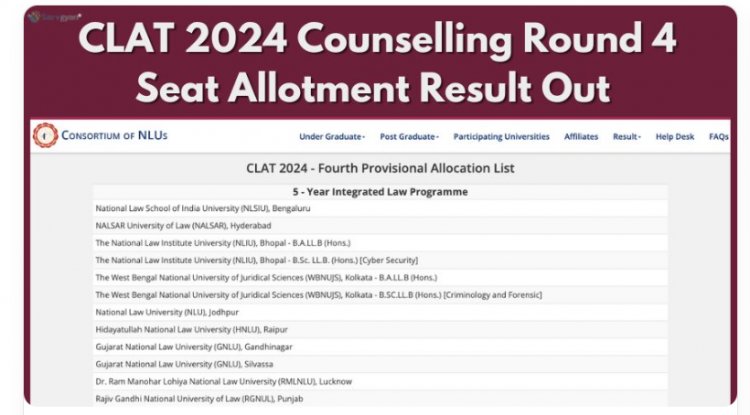CLAT 2024 Counselling Round 4 Seat Allotment Out, Direct Link Here
Check out the seat confirmation fees for the CLAT 2024 counselling along with the steps to check the allotment list here.

The Consortium of National Law Universities (NLUs) will conduct the Common Law Admission Test (CLAT) 2025 on Sunday, December 1, 2024. The exam will be held from 2 to 4 pm on the scheduled day.
An official notice from the Consortium reads, "The Executive Committee and the Governing Body of the Consortium of National Law Universities (the 'Consortium') at their meetings held on April 26, 2024, decided that the Common Law Admission Test (CLAT) 2025 shall be conducted on Sunday, December 1, 2024, from 2 pm-4 pm. Further details regarding the syllabus, application and counselling process shall be released shortly."
Registration for the exam will begin soon, and the details will be posted on the Consortium's website.
The pattern of Undergraduate CLAT question paper 2024
The undergraduate question paper was conducted for a maximum of 120 marks. The CLAT 2024 lasted two hours. There were 120 Multiple-Choice questions, each worth one mark. For each wrong answer, 0.25 was negatively marked.
The paper had questions from sections, namely, English Language and Current Affairs, including General Knowledge, Legal Reasoning, Logical Reasoning, and Quantitative Techniques. Around 20 percent of the questions in the paper were from English Language and Logical Reasoning. Nearly 25 percent of the questions were from Current Affairs and Legal Reasoning. The Quantitative techniques had around 10 percent weightage.
Postgraduate CLAT question paper 2024
The maximum marks for the CLAT PG paper was 120. The duration of the exam was 2 hours. Around 120 MCQs were asked for one mark each. A negative marking of 0.25 was done for each wrong answer. The syllabus for the postgraduate CLAT exam included Constitutional Law, Other areas of law such as Jurisprudence, Administrative Law, Torts, Family Law, Criminal Law, Company Law, Law of Contract, Property Law,Public International Law, Tax Law, Environmental Law, and Labour and Industrial Law.




















